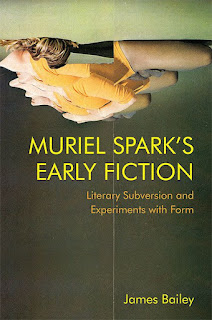Muriel Spark's Early Fiction: Literary Subversion and Experiments with Form
BY JAMES BAILEY
Edinburgh UP, March 2021
ISBN: 9781474475969 hardback
9781474475990 ePub
9781474475983 PDF
https://edinburghuniversitypress.com/book-muriel-spark-s-early-fiction.html
A compelling reappraisal of Spark’s approach to literary experimentation
- Offers a distinctive reappraisal of Spark’s fiction, which challenges the rigid critical framework that has long been applied to her writing
- Interrogates how Spark’s literary innovations work to facilitate moments of subversive satire and gendered social critique
- Presents nuanced re-readings of some of Spark’s major works, as well as lesser-discussed texts such as her only stage play, Doctors of Philosophy, and early short stories
- Draws upon detailed archival research to offer a unique insight into the social contexts and personal preoccupations that informed Spark’s writing
This book presents a detailed critical analysis of a period of significant formal and thematic innovation in Muriel Spark’s literary career. Spanning the mid-1950s to the mid-1970s, it identifies formative instances of literary experimentation in texts including The Comforters, The Driver’s Seat and The Public Image, with an emphasis on metafiction and the influence of the nouveau roman. As the first critical study to draw extensively on Spark’s vast archives of correspondence, manuscripts and research, it provides a unique insight into the social contexts and personal concerns that dictated her fiction.
Muriel Spark’s Early Fiction is a magnificent achievement, bursting with revealing and original insights into Spark’s fiction and the enduring preoccupations and working methods of this most singular author. The result is a welcome addition to the process Spark scholars have embarked upon in recent years: extricating (or ‘desegregating’) the author from the various literary-critical categories that once confined her. Bailey’s approach is flexible and multi-faceted by contrast, and draws on an impressively extensive use of previously unexamined archival material. The reader is provided with illuminating explorations of ‘instances of narrative daring’ during the first two decades of Spark’s career which range from under-examined early short stories to key texts such as The Prime of Miss Jean Brodie and The Driver’s Seat, and place the emphasis on her enduring commitment to highlight the ways women become inscribed in oppressive cultural narratives. It is a rich and readable monograph which lives up to its ambition to establish a more complex and appropriate framework to discuss Spark in our current critical era, and will therefore be essential reading for those embarking on future studies of one of the most brilliant and unusual writers of the second half of the Twentieth Century.
– Bran Nicol, University of Surrey
James Bailey is honorary research fellow in English literature at the University of Sheffield. He is the co-editor, with Emma Young, of British Women Short Story Writers: The New Woman to Now (Edinburgh University Press, 2016) as well as author of articles in peer-reviewed journals such as Contemporary Women’s Writing and European Journal of English Studies.



No comments:
Post a Comment